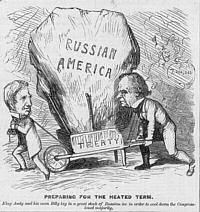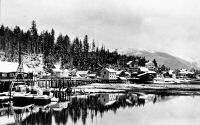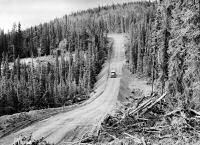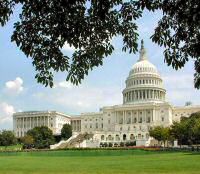 |
PREPARING FOR THE HEATED TERM
King Andy and his man Billy lay in a great
stock of Russian ice in order to cool down
the Congressional majority. |
STATEHOOD:On March 30, 1867, United States Secretary of State William
H. Seward signed the Treaty of Cession of Russian
America to the United States. The United States paid Russia $7,200,000, about 2 cents an acre, for the
territory that was to become the state of Alaska. Some Americans opposed the purchase. Derogatory nicknames
such as Seward's Folly, Seward's Icebox, Icebergia, Walrussia, and Polaria were heard across the country. The
political cartoon, to the right, refers to President Johnson as "King Andy" and to William Seward as the king's
man, "Billy," and indicates that they will have a tough time getting the purchase approved by the United States
Congress. Many Americans favored the idea however and Congress approved the purchase. On October 18, 1867,
American soldiers raised the United States flag over Sitka.
For 17 years after that, Alaska was without any formal government. First the area was presided
over by the War Department, then the U.S. Treasury, and then the Navy Department. Finally, in 1884, Congress
passed the first Organic Act, which defined Alaska as a civil and judicial district and allowed for a governor,
a code of laws, and a federal court.
Momentum was building. Interest in the area's salmon fisheries had caused the first canneries to be
built in Alaska in 1878. The discovery of gold in 1880 and the gold rush of 1897-1898 attracted thousands of
people hoping to strike it rich. Alaska's population nearly doubled, in ten years, to 63,592 by 1900.
 |
Village of Klawak - 1927
West coast Prince of Wales Island
Home of Alaska's 1st Salmon Cannery |
Over
the years, some small allowances were made for Alaska and in 1912 Congress passed the second Organic Act, which
allowed Alaska a territorial legislature with limited powers. The first Alaska statehood bill was
introduced in Congress in 1916, but it never received a hearing.
With World War II, the United States recognized a strategic importance in Alaska. In fact, Kiska
and Attu islands, two islands of the Aleutian Islands chain were occupied by the Japanese.
 |
Alaska (Alcan) Highway between
Edmonton, Canada and Fairbanks, Alaska |
The United States
built the Alaska (Alcan) Highway in 1942 as a military supply route. In 1943, about 143,000 military personnel were
stationed in Alaska. The United States recovered Kiska and Attu islands later that year and the demands for
Alaska statehood increased.
Additional bills were introduced throughout the mid-1940s, but it wasn't until 1958 that Congress
voted to admit Alaska to the Union. Alaska was inducted into the Union in 1959. On January 3, 1959, President
Eisenhower signed the official declaration, which
made the territory of Alaska the 49th state. Alaska became the first new state admitted to the Union since
1912. The headline in the Anchorage News read "IKE SAYS: YOU'RE IN NOW!" |
| |
| STATE CONSTITUTION:A constitution sets out the rules by which we play the game
of government. Like the rules for any other game, it limits the moves available to players. It describes how
the various players interact with each other, and who has more power in various situations.
The Alaska Territory Constitutional Convention adopted the Alaska Constitution on February 5, 1956.
The citizens of Alaska ratified it on April 24, 1956. It became effective when Alaska was formally
inducted into the Union on January 3, 1959.
1. INHERENT RIGHTS:This constitution is dedicated to the principles that all
persons have a natural right to life, liberty, the pursuit of happiness, and the enjoyment of the rewards
of their own industry; that all persons are equal and entitled to equal rights, opportunities, and
protection under the law; and that all persons have corresponding obligations to the people and to the
State.
[ ALASKA CONSTITUTION ] |
| |
|
STATE MOTTO:The United States purchased Alaska from Russia in 1867. In 1963,
the Alaska Centennial Commission was organizing for the celebration of the event in 1967. In preparation, they
sponsored a contest to come up with a centennial motto that would express the quality of the state. They offered
a $400.00 prize to the winning entry. In December 1963, the commission announced that they had selected Juneau
newsman Richard Peter's suggestion, North to the Future.
The motto represents a forward-looking optimism, a state of promise. Richard Peter is quoted that the motto
"...is a reminder that beyond the horizon of urban clutter there is a Great Land beneath our flag that can provide a new tomorrow
for this century's 'huddled masses yearning to be free.' "
The Alaska Legislature adopted North to the Future as the official motto of Alaska in 1967, during Alaska's Purchase Centennial. |
| |
|
STATE GOVERNMENT:Alaskans elect a governor and a lieutenant governor to four-year terms. The
governor, who appoints the heads of all state
departments and many other officials, is considered one of the most powerful governors in the United States.
The Alaska State Legislature includes a Senate and House of Representatives. 40 representatives serve in
the Alaska House of Representatives. 20 senators serve in the Alaska Senate.
Two basic forms of local government exist in Alaska: the city and the borough. The borough is similar to
the areas referred to as counties in most other states. Alaska is unique, among the states, because most of it
has not yet been organized into political units such as boroughs or cities.
[ GREAT SEAL OF ALASKA ]
[ ALASKA STATE FLAG ] |
| |
 |
| Alaska Governor Bill Walker |
GOVERNOR:William M. "Bill" Walker (Independent)
FIRST LADY:Donna Walker
[ GOVERNOR'S PAGE ]
[ FORMER STATE GOVERNORS ]
[ GOVERNOR'S MANSION ]
[ MANSION PHOTOGRAPH ]
[ PANORAMIC VIEW ]
|
| |

Alaska State Capitol Building
Photograph courtesy of the
Alaska Dept. of Community and
Economic Development |
ALASKA CAPITOL BUILDING:
Location: Juneau
Date Erected: 1931
- The United States Congress authorized the construction and an initial amount of money for the
building in 1911, but construction did not begin until 1929.
- Territorial Governor George A. Parks broke ground for the new capitol on September 18, 1929.
- Construction on the capitol building was finished in 1931, 28 years before Alaska became a state in
1959. Today the Alaska Capitol houses the offices of the state legislature, the governor, and the
lieutenant governor.
- Construction is brick faced reinforced concrete. The lower facade is faced with limestone.
The limestone and marble used in the four columns of the portico and in the lobby came from
Prince of Wales Island in southeast Alaska.
- A replica of the Liberty Bell, given to Alaska as part of a promotional campaign for U.S. Savings Bonds,
stands in front of the building.
[ HISTORY ]
[ TOUR ] (47.5 MB - Windows Media Player required) |
| |
| STATE REPRESENTATION:The Alaska Legislature is composed of two bodies like
the United States Congress, the House of Representatives and the Senate. The Alaska Legislature is responsible
for making the laws in Alaska and for raising and distributing the money necessary to run the state government.
[ LEGISLATIVE BRANCH ] |
| STATE REPRESENTATIVES:Representatives in Alaska each represent people
in a specific area of the state. These areas are called house districts. There are currently 40 men and women
representing 40 House districts in the Alaska House of Representatives. 23 representatives are Republicans
and 17 are Democrats. Each representative serves for a period of two years in the House of Representatives,
after which he or she must run for re-election.
[ STATE REPRESENTATIVES ]
[ LEGISLATIVE DISTRICTS ] |
STATE SENATORS:Senators in Alaska each represent people
in a specific area of the state. These areas are called Senate districts. There are currently 20 men and women
representing 20 Senate districts in the Alaska Senate. 11 senators are Republicans and 9 are Democrats. Each
senator serves for a period of four years in the Senate, after which he or she must run for re-election.
[ STATE SENATORS ]
[ LEGISLATIVE DISTRICTS ] |
|
| |
|
LEGISLATIVE PROCESS:The legislative branch of government is responsible for making and
maintaining laws within their jurisdiction. United States representatives and senators, federal legislators,
are responsible for laws at the national level and state legislators are responsible for laws at the state
level. A law begins as an idea that is introduced to legislators as a bill by one or more legislators. The
bill then goes through the legislative process to become a law. During this process the bill may be changed.
Not all bills become law.
[ HOW A BILL BECOMES LAW IN ALASKA ] (PDF file)
[ POWERPOINT PRESENTATION ]
[ VIDEO ] (34.1 MB - Windows Media Player required) |
| |
| CURRENT LEGISLATION:When the legislature is meeting, it is said
to be "in session." Most years the Legislative session begins meeting (convenes) on the second Monday in
January. But, in the year following a gubernatorial (governor election) election, the legislature convenes on
the third Monday in January unless that happens to fall on Martin Luther King Jr. Day, in which case it
convenes on the Tuesday after. Session ends (adjourns) after a period of 120 days. In other words, Alaska
legislators meet in January for a period of 120 days each year. The following link will
allow you to look at bills that are currently going through the legislative process.
[ CURRENT LEGISLATION ] |
| |
| STATUTES AND REGULATIONS:The following link will allow you to look at
Alaska's current laws and regulations.
[ ALASKA STATUTES AND REGULATIONS ] |
| |
| BOROUGHS, NOT COUNTIES:The United States Constitution does not define local
government. Instead, this function is left up to the states.
Counties are a local unit of government within a state. All but two of the states are divided into counties. Alaska is divided
into boroughs and census districts and Louisiana is divided into parishes. Governing responsibilities are similar to counties.
Traditionally, counties performed tasks mandated by the state, such as property assessment, property and vital
statistic record keeping, maintenance of rural roads, administration of local election and judicial functions,
and support of the poor. Today, counties may be responsible for these functions, more or less, but the
responsibilities of county governments vary from state to state.
Alaska is unique among the states. It's extremely large, much of the state is sparsely populated, and much of
the state has not been divided into local governing units in the manner of counties. Instead of local
divisions of government established as counties, Alaska is divided into a group of boroughs and geographical
census areas.
| BOROUGH TRIVIA:
- Alaska is divided into 16 boroughs and 11 geographical census areas.
- The largest borough, the North Slope Borough, has a land area of 87,860 square miles.
- The smallest borough, the Bristol Bay Borough, has a land area of 519 square miles.
- The most populated borough, the Anchorage Borough, has a population (2000) of 260,283.
- The least populated borough, the City & Borough of Yakutat, has a population (2002) of 808.
[ LOCAL GOVERNMENT IN ALASKA ] 
[ ASSOCIATION OF U.S. COUNTIES ]
[ US CENSUS BUREAU ]
[ BOROUGHS, CENSUS AREAS & REGIONS ]
[ STATE MAPS ] |
|
| |
 |
United States Capitol Building
Washington, DC |
U.S. CONGRESSIONAL DELEGATION:
The legislative branch of the United States government makes laws for our nation and raises and distributes
money to run the United States government. The most evident part of the legislative branch is the United
States Congress. Congress is divided into two parts, called houses. The two parts are the Senate and the House
of Representatives. Congress is referred to as a bicameral body because it is
made up of two houses. The Latin roots of the word bicameral, "bi" and "cameral," mean two chambers or rooms.
Members of the Senate are called Senators and members of the House of Representatives are called Representatives.
Senators and representatives serving in these two bodies are sometimes referred to as congressmen, or women, and
sometimes as legislators because their business is to legislate or make laws. The role of the legislative
branch is defined in the United States Constitution.
[ THE UNITED STATES CONSTITUTION ]
Each state elects people to represent them in the United States Congress in Washington, DC. The citizens of each
state elect two senators to represent them in the Senate. They also elect representatives to represent them in
the House of Representatives. The number of representatives each state sends to the House of Representatives
is not a specific number like the Senate, but is based on the population of the state. The people, that are
elected to represent the state's citizens in the United States Congress, are referred to as the congressional
delegation.
There are 100 senators in the U.S. Senate. Each is elected to a term, in the Senate, of six years. There are 435
representatives in the U.S. House of Representatives. Each is elected to a term, in the "House," of two
years.
The citizens of Alaska elect two people, like every other state, to represent them in the Senate and one person,
based on Alaska's population, to represent them in the House of Representatives.
Senate Districts (2):
U.S. Senate (2):Senators Lisa Murkowski (Republican)
and Mark Begich (Democrat)
House District (1):Map
U.S. House of Representatives (1):Congressman Don Young (Republican) |
| |
|
broken links to us. We really appreciate it. |
Source: The Office of Governor Sean Parnell, (http://gov.state.ak.us), December 13, 2006
Source: State of Alaska, (http://www.state.ak.us), April 7, 2004
Source: Alaska Legislature, (http://w3.legis.state.ak.us/), April 7, 2004 |

 |
|
|
[ HOME
|| INTRO
|| SYMBOLS
|| ALMANAC
|| ECONOMY
|| GEOGRAPHY
|| STATE MAPS
|| PEOPLE
|| GOVERNMENT
]
[ FORUM
|| NEWS
|| COOL SCHOOLS
|| STATE QUIZ
|| BOOK STORE
|| MARKETPLACE
|| STATE LINKS
|| MUSEUMS
]
|| GUESTBOOK
|| CONTACT US
|| PRIVACY STATEMENT
] |
Site designed exclusively for NETSTATE.COM by NSTATE

NETSTATE.COM is a Trademark of NSTATE, LLC.
Copyright © 2003- by NSTATE, LLC. All rights reserved.
No copyright is claimed on non-original or licensed material.
Support NETSTATE
Top |
|



